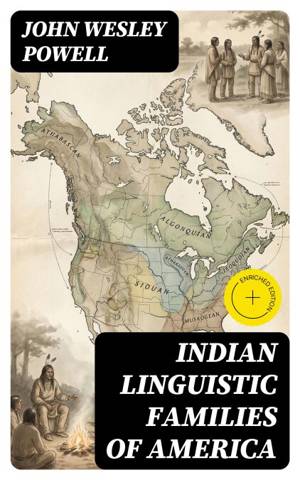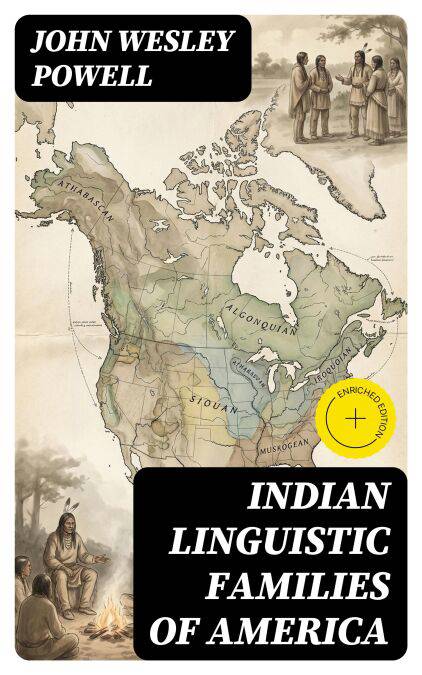
- Afhalen na 1 uur in een winkel met voorraad
- Gratis thuislevering in België vanaf € 30
- Ruim aanbod met 7 miljoen producten
- Afhalen na 1 uur in een winkel met voorraad
- Gratis thuislevering in België vanaf € 30
- Ruim aanbod met 7 miljoen producten
Zoeken
€ 1,99
+ 1 punten
Uitvoering
Omschrijving
In "Indian Linguistic Families of America," John Wesley Powell presents a groundbreaking exploration of the diverse linguistic landscapes of Native American languages. This work, published in 1891, epitomizes Powell's meticulous empirical approach, as he categorizes languages into families based on grammatical, phonetic, and lexical similarities. His study not only contributes to linguistic anthropology but also sets the foundation for future research in American linguistics, illustrating the complex relationship between language and culture within indigenous communities. Powell's clarity of expression and systematic methodology reflect the intellectual rigor characteristic of the late 19th-century scientific discourse, making it a seminal text in both linguistic and ethnographic studies. John Wesley Powell was a prominent American geologist, explorer, and anthropologist whose adventurous spirit led him to explore the uncharted regions of the American West. His experiences during the Civil War and subsequent expeditions along the Colorado River forged a deep respect for the Native American tribes he encountered. This respect is evident in his comprehensive documentation and representation of their languages, reflecting Powell's belief in the intrinsic value of all cultures and the importance of preserving their legacies. Readers interested in linguistics, anthropology, or American history will find "Indian Linguistic Families of America" to be an indispensable resource. Powell's keen insights and thorough analysis invite us to appreciate the rich tapestry of indigenous languages, encouraging a deeper understanding of the cultural identities they represent. This work remains a vital scholarly contribution for those seeking to engage with the intricate dynamics of language and identity.
In this enriched edition, we have carefully created added value for your reading experience:
- A succinct Introduction situates the work's timeless appeal and themes.
- The Synopsis outlines the central plot, highlighting key developments without spoiling critical twists.
- A detailed Historical Context immerses you in the era's events and influences that shaped the writing.
- An Author Biography reveals milestones in the author's life, illuminating the personal insights behind the text.
- A thorough Analysis dissects symbols, motifs, and character arcs to unearth underlying meanings.
- Reflection questions prompt you to engage personally with the work's messages, connecting them to modern life.
- Hand‐picked Memorable Quotes shine a spotlight on moments of literary brilliance.
- Interactive footnotes clarify unusual references, historical allusions, and archaic phrases for an effortless, more informed read.
In this enriched edition, we have carefully created added value for your reading experience:
- A succinct Introduction situates the work's timeless appeal and themes.
- The Synopsis outlines the central plot, highlighting key developments without spoiling critical twists.
- A detailed Historical Context immerses you in the era's events and influences that shaped the writing.
- An Author Biography reveals milestones in the author's life, illuminating the personal insights behind the text.
- A thorough Analysis dissects symbols, motifs, and character arcs to unearth underlying meanings.
- Reflection questions prompt you to engage personally with the work's messages, connecting them to modern life.
- Hand‐picked Memorable Quotes shine a spotlight on moments of literary brilliance.
- Interactive footnotes clarify unusual references, historical allusions, and archaic phrases for an effortless, more informed read.
Specificaties
Betrokkenen
- Auteur(s):
- Uitgeverij:
Inhoud
- Aantal bladzijden:
- 223
- Taal:
- Engels
Eigenschappen
- Productcode (EAN):
- 8596547753346
- Verschijningsdatum:
- 13/12/2023
- Uitvoering:
- E-book
- Beveiligd met:
- Digital watermarking
- Formaat:
- ePub

Alleen bij Standaard Boekhandel
+ 1 punten op je klantenkaart van Standaard Boekhandel
Beoordelingen
We publiceren alleen reviews die voldoen aan de voorwaarden voor reviews. Bekijk onze voorwaarden voor reviews.







